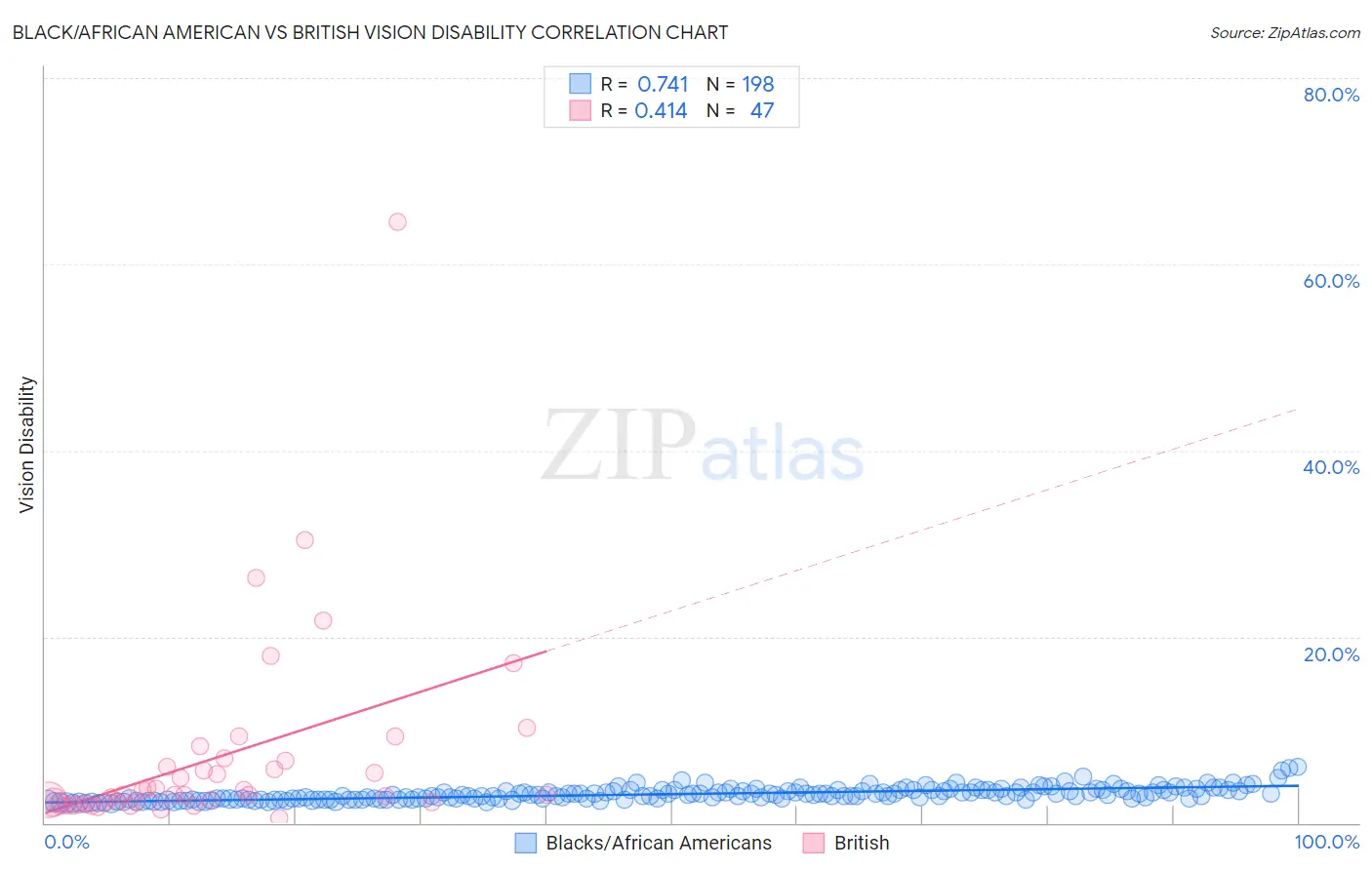Black/African American vs British Vision Disability
COMPARE
Black/African American
British
Vision Disability
Vision Disability Comparison
Blacks/African Americans
British
2.8%
VISION DISABILITY
0.0/ 100
METRIC RATING
320th/ 347
METRIC RANK
2.2%
VISION DISABILITY
25.1/ 100
METRIC RATING
193rd/ 347
METRIC RANK
Black/African American vs British Vision Disability Correlation Chart
The statistical analysis conducted on geographies consisting of 564,452,359 people shows a strong positive correlation between the proportion of Blacks/African Americans and percentage of population with vision disability in the United States with a correlation coefficient (R) of 0.741 and weighted average of 2.8%. Similarly, the statistical analysis conducted on geographies consisting of 530,471,861 people shows a moderate positive correlation between the proportion of British and percentage of population with vision disability in the United States with a correlation coefficient (R) of 0.414 and weighted average of 2.2%, a difference of 26.5%.

Vision Disability Correlation Summary
| Measurement | Black/African American | British |
| Minimum | 2.1% | 0.53% |
| Maximum | 6.0% | 64.6% |
| Range | 3.9% | 64.1% |
| Mean | 3.1% | 7.1% |
| Median | 3.0% | 3.0% |
| Interquartile 25% (IQ1) | 2.5% | 2.2% |
| Interquartile 75% (IQ3) | 3.5% | 6.6% |
| Interquartile Range (IQR) | 0.91% | 4.5% |
| Standard Deviation (Sample) | 0.70% | 10.8% |
| Standard Deviation (Population) | 0.70% | 10.7% |
Similar Demographics by Vision Disability
Demographics Similar to Blacks/African Americans by Vision Disability
In terms of vision disability, the demographic groups most similar to Blacks/African Americans are Tohono O'odham (2.8%, a difference of 0.69%), Comanche (2.8%, a difference of 2.0%), Alaska Native (2.7%, a difference of 2.1%), Paiute (2.9%, a difference of 2.5%), and Tlingit-Haida (2.9%, a difference of 2.5%).
| Demographics | Rating | Rank | Vision Disability |
| Potawatomi | 0.0 /100 | #313 | Tragic 2.6% |
| Inupiat | 0.0 /100 | #314 | Tragic 2.7% |
| Osage | 0.0 /100 | #315 | Tragic 2.7% |
| Shoshone | 0.0 /100 | #316 | Tragic 2.7% |
| Yup'ik | 0.0 /100 | #317 | Tragic 2.7% |
| Alaska Natives | 0.0 /100 | #318 | Tragic 2.7% |
| Tohono O'odham | 0.0 /100 | #319 | Tragic 2.8% |
| Blacks/African Americans | 0.0 /100 | #320 | Tragic 2.8% |
| Comanche | 0.0 /100 | #321 | Tragic 2.8% |
| Paiute | 0.0 /100 | #322 | Tragic 2.9% |
| Tlingit-Haida | 0.0 /100 | #323 | Tragic 2.9% |
| Hopi | 0.0 /100 | #324 | Tragic 2.9% |
| Cherokee | 0.0 /100 | #325 | Tragic 2.9% |
| Spanish Americans | 0.0 /100 | #326 | Tragic 2.9% |
| Natives/Alaskans | 0.0 /100 | #327 | Tragic 3.0% |
Demographics Similar to British by Vision Disability
In terms of vision disability, the demographic groups most similar to British are European (2.2%, a difference of 0.050%), Canadian (2.2%, a difference of 0.060%), Immigrants from Costa Rica (2.2%, a difference of 0.080%), Immigrants from Barbados (2.2%, a difference of 0.090%), and Immigrants (2.2%, a difference of 0.11%).
| Demographics | Rating | Rank | Vision Disability |
| Native Hawaiians | 33.3 /100 | #186 | Fair 2.2% |
| Immigrants | St. Vincent and the Grenadines | 30.3 /100 | #187 | Fair 2.2% |
| Guyanese | 28.9 /100 | #188 | Fair 2.2% |
| Salvadorans | 27.4 /100 | #189 | Fair 2.2% |
| Immigrants | Costa Rica | 26.1 /100 | #190 | Fair 2.2% |
| Canadians | 25.8 /100 | #191 | Fair 2.2% |
| Europeans | 25.7 /100 | #192 | Fair 2.2% |
| British | 25.1 /100 | #193 | Fair 2.2% |
| Immigrants | Barbados | 24.0 /100 | #194 | Fair 2.2% |
| Immigrants | Immigrants | 23.7 /100 | #195 | Fair 2.2% |
| Immigrants | Grenada | 23.1 /100 | #196 | Fair 2.2% |
| Ghanaians | 21.8 /100 | #197 | Fair 2.2% |
| Czechoslovakians | 21.6 /100 | #198 | Fair 2.2% |
| Immigrants | El Salvador | 21.0 /100 | #199 | Fair 2.2% |
| Immigrants | Thailand | 20.1 /100 | #200 | Fair 2.2% |